Suriname - SR - SUR - SUR - South America
Last updated: January 18, 2026
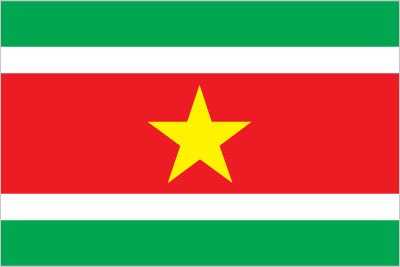
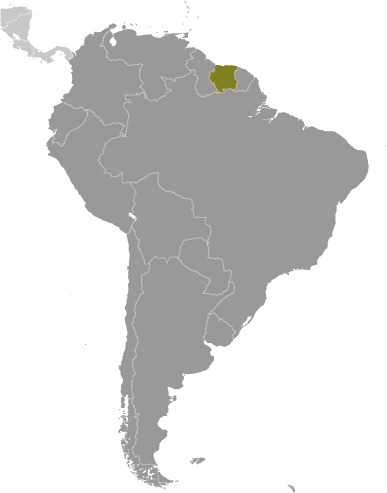
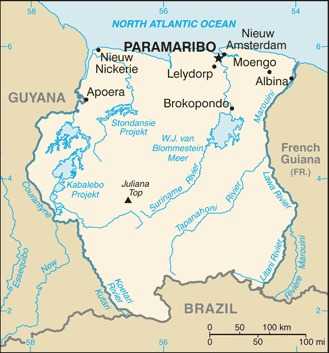
Suriname Images
Suriname Factbook Data
Diplomatic representation from the US
chief of mission: Ambassador Robert J. FAUCHER (since 31 January 2023)
embassy: 165 Kristalstraat, Paramaribo
mailing address: 3390 Paramaribo Place, Washington DC 20521-3390
telephone: [597] 556-700
FAX: [597] 551-524
email address and website:
caparamar@state.gov
https://sr.usembassy.gov/
embassy: 165 Kristalstraat, Paramaribo
mailing address: 3390 Paramaribo Place, Washington DC 20521-3390
telephone: [597] 556-700
FAX: [597] 551-524
email address and website:
caparamar@state.gov
https://sr.usembassy.gov/
Age structure
0-14 years: 22.5% (male 73,864/female 71,573)
15-64 years: 70% (male 226,417/female 226,235)
65 years and over: 7.5% (2024 est.) (male 20,071/female 28,598)
15-64 years: 70% (male 226,417/female 226,235)
65 years and over: 7.5% (2024 est.) (male 20,071/female 28,598)
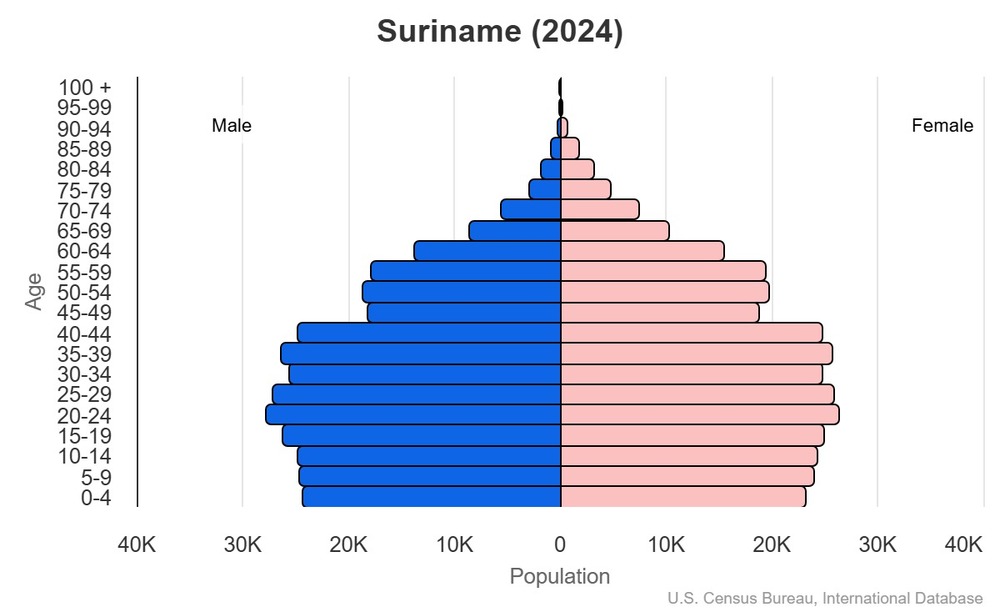
This is the population pyramid for Suriname. A population pyramid illustrates the age and sex structure of a country's population and may provide insights about political and social stability, as well as economic development. The population is distributed along the horizontal axis, with males shown on the left and females on the right. The male and female populations are broken down into 5-year age groups represented as horizontal bars along the vertical axis, with the youngest age groups at the bottom and the oldest at the top. The shape of the population pyramid gradually evolves over time based on fertility, mortality, and international migration trends.
For additional information, please see the entry for Population pyramid on the Definitions and Notes page.
For additional information, please see the entry for Population pyramid on the Definitions and Notes page.
Geographic coordinates
4 00 N, 56 00 W
Sex ratio
at birth: 1.07 male(s)/female
0-14 years: 1.03 male(s)/female
15-64 years: 1 male(s)/female
65 years and over: 0.7 male(s)/female
total population: 0.98 male(s)/female (2024 est.)
0-14 years: 1.03 male(s)/female
15-64 years: 1 male(s)/female
65 years and over: 0.7 male(s)/female
total population: 0.98 male(s)/female (2024 est.)
Natural hazards
flooding
Area - comparative
slightly larger than Georgia
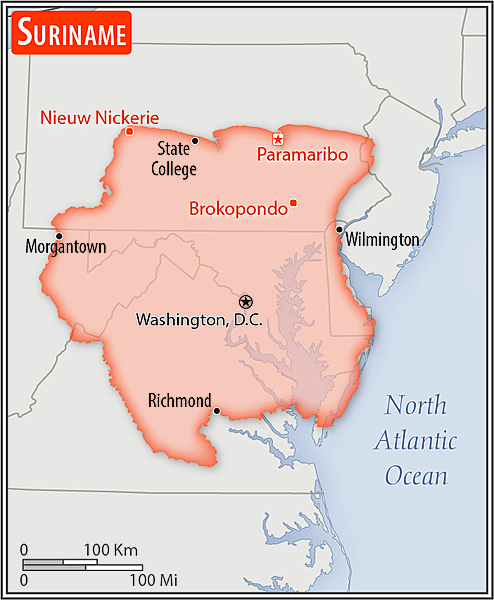
slightly larger than Georgia
Background
The Spaniards first explored Suriname in the 16th century, and the English then settled it in the mid-17th century. Suriname became a Dutch colony in 1667. With the abolition of African slavery in 1863, workers were brought in from India and Java. The Netherlands granted the colony independence in 1975. Five years later, the civilian government was replaced by a military regime that soon declared Suriname a socialist republic. It continued to exert control through a succession of nominally civilian administrations until 1987, when international pressure finally forced a democratic election. In 1990, the military overthrew the civilian leadership, but a democratically elected government -- a four-party coalition -- returned to power in 1991. The coalition expanded to eight parties in 2005 and ruled until 2010, when voters returned former military leader Desire BOUTERSE and his opposition coalition to power. President BOUTERSE ran unopposed in 2015 and was reelected. Opposition parties campaigned hard against BOUTERSE in the run-up to the 2020 elections, and a multi-party coalition led by Chandrikapersad SANTOKHI’s VHP and Ronnie Brunswijk’s ABOP was installed.
Environmental issues
deforestation; pollution of inland waterways from small-scale mining activities
International environmental agreements
party to: Biodiversity, Climate Change, Climate Change-Kyoto Protocol, Climate Change-Paris Agreement, Comprehensive Nuclear Test Ban, Desertification, Endangered Species, Hazardous Wastes, Law of the Sea, Marine Dumping-London Convention, Marine Dumping-London Protocol, Nuclear Test Ban, Ozone Layer Protection, Ship Pollution, Tropical Timber 2006, Wetlands, Whaling
signed, but not ratified: none of the selected agreements
signed, but not ratified: none of the selected agreements
Household income or consumption by percentage share
lowest 10%: 2.2% (2022 est.)
highest 10%: 30.1% (2022 est.)
note: % share of income accruing to lowest and highest 10% of population
highest 10%: 30.1% (2022 est.)
note: % share of income accruing to lowest and highest 10% of population
Exports - commodities
gold, fish, refined petroleum, wood, tobacco (2023)
note: top five export commodities based on value in dollars
note: top five export commodities based on value in dollars
Exports - partners
Switzerland 49%, UAE 28%, Guyana 5%, USA 4%, France 3% (2023)
note: top five export partners based on percentage share of exports
note: top five export partners based on percentage share of exports
Administrative divisions
10 districts (distrikten, singular - distrikt); Brokopondo, Commewijne, Coronie, Marowijne, Nickerie, Para, Paramaribo, Saramacca, Sipaliwini, Wanica
Agricultural products
rice, sugarcane, oranges, vegetables, chicken, cassava, plantains, pineapples, eggs, citrus fruits (2023)
note: top ten agricultural products based on tonnage
note: top ten agricultural products based on tonnage
Budget
revenues: $863 million (2019 est.)
expenditures: $1.648 billion (2019 est.)
expenditures: $1.648 billion (2019 est.)
Capital
name: Paramaribo
geographic coordinates: 5 50 N, 55 10 W
time difference: UTC-3 (2 hours ahead of Washington, DC, during Standard Time)
etymology: the name comes from the Guaraní words para (water or river) and maribo (inhabitants)
geographic coordinates: 5 50 N, 55 10 W
time difference: UTC-3 (2 hours ahead of Washington, DC, during Standard Time)
etymology: the name comes from the Guaraní words para (water or river) and maribo (inhabitants)
Imports - commodities
refined petroleum, ships, excavation machinery, trucks, tobacco (2023)
note: top five import commodities based on value in dollars
note: top five import commodities based on value in dollars
Climate
tropical; moderated by trade winds
Coastline
386 km
Constitution
history: previous 1975; latest ratified 30 September 1987, effective 30 October 1987
amendment process: proposed by the National Assembly; passage requires at least two-thirds majority vote of the total membership
amendment process: proposed by the National Assembly; passage requires at least two-thirds majority vote of the total membership
Exchange rates
Surinamese dollars (SRD) per US dollar -
Exchange rates:
33.181 (2024 est.)
36.776 (2023 est.)
24.709 (2022 est.)
18.239 (2021 est.)
9.31 (2020 est.)
Exchange rates:
33.181 (2024 est.)
36.776 (2023 est.)
24.709 (2022 est.)
18.239 (2021 est.)
9.31 (2020 est.)
Executive branch
chief of state: President Jennifer GEERLINGS-SIMONS (since 16 July 2025)
head of government: President Jennifer GEERLINGS-SIMONS (since 16 July 2025)
cabinet: Cabinet of Ministers appointed by the president
election/appointment process: president and vice president indirectly elected by the National Assembly; president and vice president serve a 5-year term (no term limits)
most recent election date: 6 July 2025
election results:
2025: Jennifer GEERLINGS-SIMONS elected president unopposed; National Assembly vote - NA
2020: Chandrikapersad "Chan" SANTOKHI elected president unopposed; National Assembly vote - NA
2015: Desire Delano BOUTERSE reelected president unopposed; National Assembly vote - NA
expected date of next election: 2030
note: the president is both chief of state and head of government
head of government: President Jennifer GEERLINGS-SIMONS (since 16 July 2025)
cabinet: Cabinet of Ministers appointed by the president
election/appointment process: president and vice president indirectly elected by the National Assembly; president and vice president serve a 5-year term (no term limits)
most recent election date: 6 July 2025
election results:
2025: Jennifer GEERLINGS-SIMONS elected president unopposed; National Assembly vote - NA
2020: Chandrikapersad "Chan" SANTOKHI elected president unopposed; National Assembly vote - NA
2015: Desire Delano BOUTERSE reelected president unopposed; National Assembly vote - NA
expected date of next election: 2030
note: the president is both chief of state and head of government
Flag
description: five horizontal bands of green (top, double-width), white, red (quadruple-width), white, and green (double-width); a five-pointed yellow star is centered on the red band
meaning: red stands for progress and love, green for hope and fertility, and white for peace, justice, and freedom; the star represents the unity of ethnic groups
meaning: red stands for progress and love, green for hope and fertility, and white for peace, justice, and freedom; the star represents the unity of ethnic groups
Independence
25 November 1975 (from the Netherlands)
Industries
gold mining, oil, lumber, food processing, fishing
Judicial branch
highest court(s): High Court of Justice of Suriname (consists of the court president, vice president, and 4 judges)
judge selection and term of office: court judges appointed by the national president in consultation with the National Assembly, the State Advisory Council, and the Order of Private Attorneys; judges serve for life
subordinate courts: cantonal courts
note: appeals beyond the High Court are referred to the Caribbean Court of Justice; human rights violations can be appealed to the Inter-American Commission on Human Rights with judgments issued by the Inter-American Court on Human Rights
judge selection and term of office: court judges appointed by the national president in consultation with the National Assembly, the State Advisory Council, and the Order of Private Attorneys; judges serve for life
subordinate courts: cantonal courts
note: appeals beyond the High Court are referred to the Caribbean Court of Justice; human rights violations can be appealed to the Inter-American Commission on Human Rights with judgments issued by the Inter-American Court on Human Rights
Land boundaries
total: 1,907 km
border countries (3): Brazil 515 km; French Guiana 556 km; Guyana 836 km
border countries (3): Brazil 515 km; French Guiana 556 km; Guyana 836 km
Land use
agricultural land: 0.4% (2023 est.)
arable land: 0.3% (2023 est.)
permanent crops: 0% (2023 est.)
permanent pasture: 0.1% (2023 est.)
forest: 91.7% (2023 est.)
other: 7.9% (2023 est.)
arable land: 0.3% (2023 est.)
permanent crops: 0% (2023 est.)
permanent pasture: 0.1% (2023 est.)
forest: 91.7% (2023 est.)
other: 7.9% (2023 est.)
Legal system
civil law system influenced by Dutch civil law
Legislative branch
legislature name: National Assembly (Nationale Assemblee)
legislative structure: unicameral
number of seats: 51 (all directly elected)
electoral system: proportional representation
scope of elections: full renewal
term in office: 5 years
most recent election date: 5/25/2025
parties elected and seats per party: National Democratic Party (NDP) (18); Progressive Reform Party (VHP) (17); National Party of Suriname (NPS) (6); General Liberation and Development Party (ABOP) (6); Other (4)
percentage of women in chamber: 31.4%
expected date of next election: May 2030
legislative structure: unicameral
number of seats: 51 (all directly elected)
electoral system: proportional representation
scope of elections: full renewal
term in office: 5 years
most recent election date: 5/25/2025
parties elected and seats per party: National Democratic Party (NDP) (18); Progressive Reform Party (VHP) (17); National Party of Suriname (NPS) (6); General Liberation and Development Party (ABOP) (6); Other (4)
percentage of women in chamber: 31.4%
expected date of next election: May 2030
Maritime claims
territorial sea: 12 nm
exclusive economic zone: 200 nm
exclusive economic zone: 200 nm
International organization participation
ACP, ACS, AOSIS, Caricom, CD, CDB, CELAC, FAO, G-77, IADB, IBRD, ICAO, ICCt, ICRM, IDA, IDB, IFAD, IFC, IFRCS, IHO, ILO, IMF, IMO, Interpol, IOC, IOM, IPU, ISO (correspondent), ITU, ITUC (NGOs), LAES, MIGA, NAM, OAS, OIC, OPANAL, OPCW, PCA, Petrocaribe, UN, UNASUR, UNCTAD, UNESCO, UNIDO, UPU, WHO, WIPO, WMO, WTO
National holiday
Independence Day, 25 November (1975)
Nationality
noun: Surinamer(s)
adjective: Surinamese
adjective: Surinamese
Natural resources
timber, hydropower, fish, kaolin, shrimp, bauxite, gold, and small amounts of nickel, copper, platinum, iron ore
Geography - note
smallest independent country on the South American continent; mostly tropical rainforest; great diversity of flora and fauna; relatively small population, mostly along the coast
Economic overview
upper middle-income South American economy; new floating currency regime; key aluminum goods, gold, and hydrocarbon exporter; new IMF plan for economic recovery and fiscal sustainability; controversial hardwood industry
Political parties
Brotherhood and Unity in Politics or BEP
Democratic Alternative '91 or DA91
General Liberation and Development Party or ABOP
National Democratic Party or NDP
National Party of Suriname or NPS
Party for Democracy and Development in Unity or DOE
Party for National Unity and Solidarity or KTPI
People's Alliance (Pertjajah Luhur) or PL
Progressive Workers' and Farmers' Union or PALU
Progressive Reform Party or VHP
Reform and Renewal Movement or HVB
Surinamese Labor Party or SPA
Democratic Alternative '91 or DA91
General Liberation and Development Party or ABOP
National Democratic Party or NDP
National Party of Suriname or NPS
Party for Democracy and Development in Unity or DOE
Party for National Unity and Solidarity or KTPI
People's Alliance (Pertjajah Luhur) or PL
Progressive Workers' and Farmers' Union or PALU
Progressive Reform Party or VHP
Reform and Renewal Movement or HVB
Surinamese Labor Party or SPA
Suffrage
18 years of age; universal
Terrain
mostly rolling hills; narrow coastal plain with swamps
Government type
presidential republic
Country name
conventional long form: Republic of Suriname
conventional short form: Suriname
local long form: Republiek Suriname
local short form: Suriname
former: Netherlands Guiana, Dutch Guiana
etymology: name may derive from the Surinen people who inhabited the area at the time of European contact
conventional short form: Suriname
local long form: Republiek Suriname
local short form: Suriname
former: Netherlands Guiana, Dutch Guiana
etymology: name may derive from the Surinen people who inhabited the area at the time of European contact
Location
Northern South America, bordering the North Atlantic Ocean, between French Guiana and Guyana
Map references
South America
Irrigated land
600 sq km (2020)
Diplomatic representation in the US
chief of mission: Ambassador Jan Marten Willem SCHALKWIJK (since 19 April 2022)
chancery: 4301 Connecticut Avenue NW, Suite 400, Washington, DC 20008
telephone: [1] (202) 629-4302
FAX: [1] (202) 629-4769
email address and website:
amb.vs@gov.sr
https://surinameembassy.org/index.html
consulate(s) general: Miami
chancery: 4301 Connecticut Avenue NW, Suite 400, Washington, DC 20008
telephone: [1] (202) 629-4302
FAX: [1] (202) 629-4769
email address and website:
amb.vs@gov.sr
https://surinameembassy.org/index.html
consulate(s) general: Miami
Internet users
percent of population: 78% (2023 est.)
Internet country code
.sr
GDP (official exchange rate)
$4.714 billion (2024 est.)
note: data in current dollars at official exchange rate
note: data in current dollars at official exchange rate
Total renewable water resources
99 billion cubic meters (2022 est.)
Urbanization
urban population: 66.4% of total population (2023)
rate of urbanization: 0.88% annual rate of change (2020-25 est.)
rate of urbanization: 0.88% annual rate of change (2020-25 est.)
Broadcast media
2 state-owned TV stations; 1 state-owned radio station; multiple private radio and TV stations (2019)
Drinking water source
improved:
urban: 98.7% of population (2022 est.)
rural: 96.6% of population (2022 est.)
total: 98% of population (2022 est.)
unimproved:
urban: 1.3% of population (2022 est.)
rural: 3.4% of population (2022 est.)
total: 2% of population (2022 est.)
urban: 98.7% of population (2022 est.)
rural: 96.6% of population (2022 est.)
total: 98% of population (2022 est.)
unimproved:
urban: 1.3% of population (2022 est.)
rural: 3.4% of population (2022 est.)
total: 2% of population (2022 est.)
National anthem(s)
title: "God zij met ons Suriname!" (God Be With Our Suriname)
lyrics/music: Cornelis Atses HOEKSTRA and Henry DE ZIEL/Johannes Corstianus DE PUY
history: adopted 1959; originally adapted from a Sunday-school song written in 1893; contains lyrics in both Dutch and Sranang Tongo
lyrics/music: Cornelis Atses HOEKSTRA and Henry DE ZIEL/Johannes Corstianus DE PUY
history: adopted 1959; originally adapted from a Sunday-school song written in 1893; contains lyrics in both Dutch and Sranang Tongo
Major urban areas - population
239,000 PARAMARIBO (capital) (2018)
International law organization participation
accepts compulsory ICJ jurisdiction with reservations; accepts ICCt jurisdiction
Hospital bed density
2.9 beds/1,000 population (2020 est.)
National symbol(s)
royal palm, faya lobi (flower)
Citizenship
citizenship by birth: no
citizenship by descent only: at least one parent must be a citizen of Suriname
dual citizenship recognized: no
residency requirement for naturalization: 5 years
citizenship by descent only: at least one parent must be a citizen of Suriname
dual citizenship recognized: no
residency requirement for naturalization: 5 years
Population distribution
population is concentrated along the northern coastal strip; the remainder of the country is sparsely populated
Electricity access
electrification - total population: 99% (2022 est.)
electrification - urban areas: 100%
electrification - rural areas: 98%
electrification - urban areas: 100%
electrification - rural areas: 98%
Civil aircraft registration country code prefix
PZ
Sanitation facility access
improved:
urban: 98.5% of population (2022 est.)
rural: 91.2% of population (2022 est.)
total: 96.1% of population (2022 est.)
unimproved:
urban: 1.5% of population (2022 est.)
rural: 8.8% of population (2022 est.)
total: 3.9% of population (2022 est.)
urban: 98.5% of population (2022 est.)
rural: 91.2% of population (2022 est.)
total: 96.1% of population (2022 est.)
unimproved:
urban: 1.5% of population (2022 est.)
rural: 8.8% of population (2022 est.)
total: 3.9% of population (2022 est.)
Ethnic groups
Hindustani (also known locally as "East Indians"; their ancestors emigrated from northern India in the latter part of the 19th century) 27.4%, Maroon (their African ancestors were brought to the country in the 17th and 18th centuries as slaves and escaped to the interior) 21.7%, Creole (mixed White and Black) 15.7%, Javanese 13.7%, mixed 13.4%, other 7.6%, unspecified 0.6% (2012 est.)
Religions
Protestant 23.6% (includes Evangelical 11.2%, Moravian 11.2%, Reformed 0.7%, Lutheran 0.5%), Hindu 22.3%, Roman Catholic 21.6%, Muslim 13.8%, other Christian 3.2%, Winti 1.8%, Jehovah's Witness 1.2%, other 1.7%, none 7.5%, unspecified 3.2% (2012 est.)
Languages
Dutch (official), English (widely spoken), Sranang Tongo (Surinamese, sometimes called Taki-Taki, is the native language of Creoles and much of the younger population), Caribbean Hindustani (a dialect of Hindi), Javanese
major-language sample(s):
Het Wereld Feitenboek, een omnisbare bron van informatie. (Dutch)
The World Factbook, the indispensable source for basic information. (English)
major-language sample(s):
Het Wereld Feitenboek, een omnisbare bron van informatie. (Dutch)
The World Factbook, the indispensable source for basic information. (English)
Dutch audio sample
Imports - partners
USA 22%, China 12%, Netherlands 11%, Trinidad & Tobago 9%, Guyana 8% (2023)
note: top five import partners based on percentage share of imports
note: top five import partners based on percentage share of imports
Refugees and internally displaced persons
refugees: 3,241 (2024 est.)
Elevation
highest point: Juliana Top 1,230 m
lowest point: unnamed location in the coastal plain -2 m
mean elevation: 246 m
lowest point: unnamed location in the coastal plain -2 m
mean elevation: 246 m
Physician density
1.36 physicians/1,000 population (2023)
Military expenditures
1.2% of GDP (2019 est.)
1.1% of GDP (2018 est.)
1.1% of GDP (2017 est.)
1.2% of GDP (2016 est.)
1.4% of GDP (2015 est.)
1.1% of GDP (2018 est.)
1.1% of GDP (2017 est.)
1.2% of GDP (2016 est.)
1.4% of GDP (2015 est.)
Health expenditure
5.7% of GDP (2021)
13.1% of national budget (2022 est.)
13.1% of national budget (2022 est.)
Military - note
the National Leger is responsible for defending the sovereignty and territorial integrity of Suriname against foreign aggression; other special tasks include border control and supporting domestic security as required; the military police, for example, have direct responsibility for immigration control at the country’s ports of entry, and the military assists the police in combating crime, particularly narco-trafficking, including joint military and police patrols, as well as joint special security teams; in addition, the military provides aid and assistance during times of natural emergencies and participates in socio-economic development projects (2025)
Military and security service personnel strengths
approximately 2,000 National Army (2025)
Military equipment inventories and acquisitions
the Suriname Army has a limited inventory of older or secondhand armaments originating from such suppliers as Brazil, France, the Netherlands, and India (2025)
School life expectancy (primary to tertiary education)
total: 11 years (2021 est.)
male: 10 years (2021 est.)
female: 11 years (2021 est.)
male: 10 years (2021 est.)
female: 11 years (2021 est.)
Total water withdrawal
municipal: 49.3 million cubic meters (2022 est.)
industrial: 135.5 million cubic meters (2022 est.)
agricultural: 431.1 million cubic meters (2022 est.)
industrial: 135.5 million cubic meters (2022 est.)
agricultural: 431.1 million cubic meters (2022 est.)
Waste and recycling
municipal solid waste generated annually: 78,600 tons (2024 est.)
percent of municipal solid waste recycled: 16.9% (2022 est.)
percent of municipal solid waste recycled: 16.9% (2022 est.)
Major watersheds (area sq km)
Atlantic Ocean drainage: Amazon (6,145,186 sq km)
National heritage
total World Heritage Sites: 3 (2 cultural, 1 natural)
selected World Heritage Site locales: Central Suriname Nature Reserve (n); Historic Inner City of Paramaribo (c); Jodensavanne Archaeological Site: Jodensavanne Settlement and Cassipora Creek Cemetery (c)
selected World Heritage Site locales: Central Suriname Nature Reserve (n); Historic Inner City of Paramaribo (c); Jodensavanne Archaeological Site: Jodensavanne Settlement and Cassipora Creek Cemetery (c)
Child marriage
women married by age 15: 8.8% (2018)
women married by age 18: 36% (2018)
men married by age 18: 19.6% (2018)
women married by age 18: 36% (2018)
men married by age 18: 19.6% (2018)
Coal
imports: 2 metric tons (2023 est.)
Electricity generation sources
fossil fuels: 57.1% of total installed capacity (2023 est.)
solar: 0.6% of total installed capacity (2023 est.)
hydroelectricity: 42% of total installed capacity (2023 est.)
biomass and waste: 0.3% of total installed capacity (2023 est.)
solar: 0.6% of total installed capacity (2023 est.)
hydroelectricity: 42% of total installed capacity (2023 est.)
biomass and waste: 0.3% of total installed capacity (2023 est.)
Natural gas
production: 7.173 million cubic meters (2023 est.)
consumption: 6.967 million cubic meters (2023 est.)
consumption: 6.967 million cubic meters (2023 est.)
Petroleum
total petroleum production: 14,000 bbl/day (2023 est.)
refined petroleum consumption: 17,000 bbl/day (2023 est.)
crude oil estimated reserves: 89 million barrels (2021 est.)
refined petroleum consumption: 17,000 bbl/day (2023 est.)
crude oil estimated reserves: 89 million barrels (2021 est.)
Gross reproduction rate
0.9 (2025 est.)
Currently married women (ages 15-49)
52.2% (2018 est.)
Remittances
3.4% of GDP (2024 est.)
4.3% of GDP (2023 est.)
3.9% of GDP (2022 est.)
note: personal transfers and compensation between resident and non-resident individuals/households/entities
4.3% of GDP (2023 est.)
3.9% of GDP (2022 est.)
note: personal transfers and compensation between resident and non-resident individuals/households/entities
Ports
total ports: 4 (2024)
large: 0
medium: 0
small: 1
very small: 3
ports with oil terminals: 3
key ports: Moengo, Nieuw Nickerie, Paramaribo, Paranam
large: 0
medium: 0
small: 1
very small: 3
ports with oil terminals: 3
key ports: Moengo, Nieuw Nickerie, Paramaribo, Paranam
National color(s)
green, white, red, yellow
Particulate matter emissions
12.2 micrograms per cubic meter (2019 est.)
Labor force
255,500 (2024 est.)
note: number of people ages 15 or older who are employed or seeking work
note: number of people ages 15 or older who are employed or seeking work
Youth unemployment rate (ages 15-24)
total: 24.2% (2024 est.)
male: 16.9% (2024 est.)
female: 35.9% (2024 est.)
note: % of labor force ages 15-24 seeking employment
male: 16.9% (2024 est.)
female: 35.9% (2024 est.)
note: % of labor force ages 15-24 seeking employment
Net migration rate
2.46 migrant(s)/1,000 population (2025 est.)
Median age
total: 32.3 years (2025 est.)
male: 31 years
female: 32.9 years
male: 31 years
female: 32.9 years
Debt - external
$2.645 billion (2023 est.)
note: present value of external debt in current US dollars
note: present value of external debt in current US dollars
Maternal mortality ratio
84 deaths/100,000 live births (2023 est.)
Reserves of foreign exchange and gold
$1.632 billion (2024 est.)
$1.346 billion (2023 est.)
$1.195 billion (2022 est.)
note: holdings of gold (year-end prices)/foreign exchange/special drawing rights in current dollars
$1.346 billion (2023 est.)
$1.195 billion (2022 est.)
note: holdings of gold (year-end prices)/foreign exchange/special drawing rights in current dollars
Total fertility rate
1.87 children born/woman (2025 est.)
Unemployment rate
7.4% (2024 est.)
7.7% (2023 est.)
8.2% (2022 est.)
note: % of labor force seeking employment
7.7% (2023 est.)
8.2% (2022 est.)
note: % of labor force seeking employment
Carbon dioxide emissions
2.521 million metric tonnes of CO2 (2023 est.)
from petroleum and other liquids: 2.507 million metric tonnes of CO2 (2023 est.)
from consumed natural gas: 14,000 metric tonnes of CO2 (2023 est.)
from petroleum and other liquids: 2.507 million metric tonnes of CO2 (2023 est.)
from consumed natural gas: 14,000 metric tonnes of CO2 (2023 est.)
Area
total : 163,820 sq km
land: 156,000 sq km
water: 7,820 sq km
land: 156,000 sq km
water: 7,820 sq km
Real GDP (purchasing power parity)
$12.316 billion (2024 est.)
$11.976 billion (2023 est.)
$11.68 billion (2022 est.)
note: data in 2021 dollars
$11.976 billion (2023 est.)
$11.68 billion (2022 est.)
note: data in 2021 dollars
Airports
55 (2025)
Infant mortality rate
total: 29.3 deaths/1,000 live births (2025 est.)
male: 37.6 deaths/1,000 live births
female: 21 deaths/1,000 live births
male: 37.6 deaths/1,000 live births
female: 21 deaths/1,000 live births
Gini Index coefficient - distribution of family income
39.2 (2022 est.)
note: index (0-100) of income distribution; higher values represent greater inequality
note: index (0-100) of income distribution; higher values represent greater inequality
Inflation rate (consumer prices)
16.2% (2024 est.)
51.6% (2023 est.)
52.4% (2022 est.)
note: annual % change based on consumer prices
51.6% (2023 est.)
52.4% (2022 est.)
note: annual % change based on consumer prices
Current account balance
$9.306 million (2024 est.)
$148.118 million (2023 est.)
$76.321 million (2022 est.)
note: balance of payments - net trade and primary/secondary income in current dollars
$148.118 million (2023 est.)
$76.321 million (2022 est.)
note: balance of payments - net trade and primary/secondary income in current dollars
Real GDP per capita
$19,400 (2024 est.)
$19,000 (2023 est.)
$18,700 (2022 est.)
note: data in 2021 dollars
$19,000 (2023 est.)
$18,700 (2022 est.)
note: data in 2021 dollars
Broadband - fixed subscriptions
total: 125,000 (2022 est.)
subscriptions per 100 inhabitants: 20 (2022 est.)
subscriptions per 100 inhabitants: 20 (2022 est.)
Obesity - adult prevalence rate
26.4% (2016)
Energy consumption per capita
60.896 million Btu/person (2023 est.)
Death rate
6.74 deaths/1,000 population (2025 est.)
Birth rate
14.63 births/1,000 population (2025 est.)
Electricity
installed generating capacity: 537,000 kW (2023 est.)
consumption: 1.896 billion kWh (2023 est.)
transmission/distribution losses: 245.206 million kWh (2023 est.)
consumption: 1.896 billion kWh (2023 est.)
transmission/distribution losses: 245.206 million kWh (2023 est.)
Merchant marine
total: 13 (2023)
by type: general cargo 5, oil tanker 3, other 5
by type: general cargo 5, oil tanker 3, other 5
Children under the age of 5 years underweight
6.7% (2018 est.)
Imports
$2.571 billion (2024 est.)
$2.203 billion (2023 est.)
$2.342 billion (2022 est.)
note: balance of payments - imports of goods and services in current dollars
$2.203 billion (2023 est.)
$2.342 billion (2022 est.)
note: balance of payments - imports of goods and services in current dollars
Exports
$2.793 billion (2024 est.)
$2.533 billion (2023 est.)
$2.6 billion (2022 est.)
note: balance of payments - exports of goods and services in current dollars
$2.533 billion (2023 est.)
$2.6 billion (2022 est.)
note: balance of payments - exports of goods and services in current dollars
Heliports
1 (2025)
Alcohol consumption per capita
total: 6.6 liters of pure alcohol (2019 est.)
beer: 3.4 liters of pure alcohol (2019 est.)
wine: 0.14 liters of pure alcohol (2019 est.)
spirits: 2.87 liters of pure alcohol (2019 est.)
other alcohols: 0.18 liters of pure alcohol (2019 est.)
beer: 3.4 liters of pure alcohol (2019 est.)
wine: 0.14 liters of pure alcohol (2019 est.)
spirits: 2.87 liters of pure alcohol (2019 est.)
other alcohols: 0.18 liters of pure alcohol (2019 est.)
Life expectancy at birth
total population: 72.7 years (2024 est.)
male: 69 years
female: 76.7 years
male: 69 years
female: 76.7 years
Real GDP growth rate
2.8% (2024 est.)
2.5% (2023 est.)
2.4% (2022 est.)
note: annual GDP % growth based on constant local currency
2.5% (2023 est.)
2.4% (2022 est.)
note: annual GDP % growth based on constant local currency
Industrial production growth rate
2.1% (2023 est.)
note: annual % change in industrial value added based on constant local currency
note: annual % change in industrial value added based on constant local currency
GDP - composition, by sector of origin
agriculture: 7.5% (2023 est.)
industry: 39.9% (2023 est.)
services: 48.3% (2023 est.)
note: figures may not total 100% due to non-allocated consumption not captured in sector-reported data
industry: 39.9% (2023 est.)
services: 48.3% (2023 est.)
note: figures may not total 100% due to non-allocated consumption not captured in sector-reported data
Education expenditure
2.9% of GDP (2023 est.)
8.6% national budget (2024 est.)
8.6% national budget (2024 est.)
Population growth rate
1.04% (2025 est.)
Military service age and obligation
18-28 years of age for voluntary military service for men and women; no conscription (2025)
Military and security forces
Suriname National Army (Nationaal Leger or NL); Army (Landmacht), Navy (Marine); Air Force (Luchtmacht), Military Police (Korps Militaire Politie)
Ministry of Justice and Police: Suriname Police Force (Korps Politie Suriname or KPS) (2026)
Ministry of Justice and Police: Suriname Police Force (Korps Politie Suriname or KPS) (2026)
Dependency ratios
total dependency ratio: 43 (2025 est.)
youth dependency ratio: 31.8 (2025 est.)
elderly dependency ratio: 11.2 (2025 est.)
potential support ratio: 8.9 (2025 est.)
youth dependency ratio: 31.8 (2025 est.)
elderly dependency ratio: 11.2 (2025 est.)
potential support ratio: 8.9 (2025 est.)
Population
total: 653,605 (2025 est.)
male: 323,747
female: 329,858
male: 323,747
female: 329,858
Telephones - mobile cellular
total subscriptions: 902,000 (2024 est.)
subscriptions per 100 inhabitants: 142 (2024 est.)
subscriptions per 100 inhabitants: 142 (2024 est.)
Telephones - fixed lines
total subscriptions: 129,000 (2023 est.)
subscriptions per 100 inhabitants: 20 (2023 est.)
subscriptions per 100 inhabitants: 20 (2023 est.)